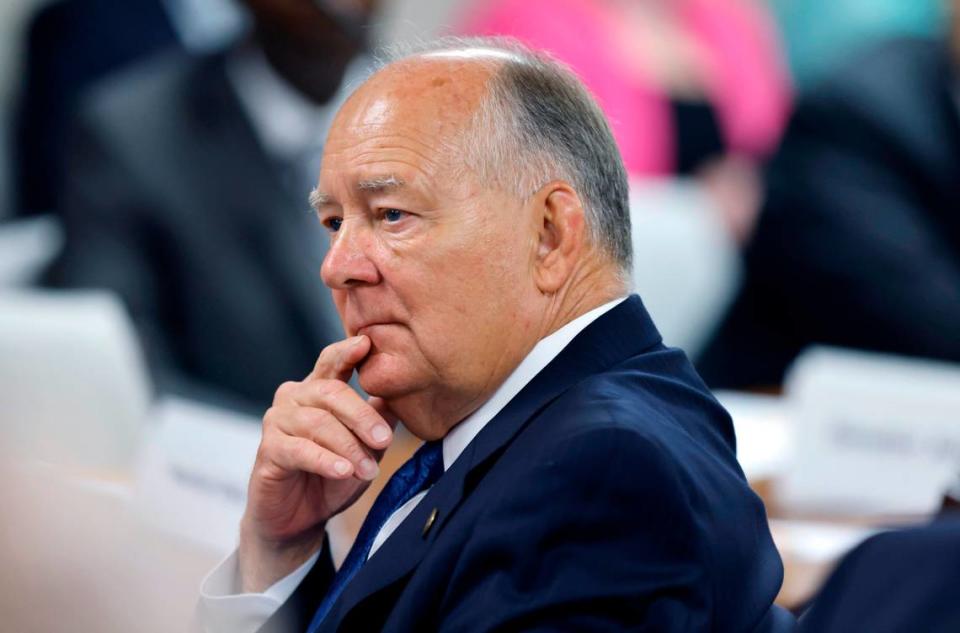NC agency disputes Berger’s reason for exempting legislators from public records laws
State lawmakers began passing a state budget Thursday that would also free them from a public records law that has exposed all manner of corruption over years, including within the General Assembly.
Senate leader Phil Berger said they need the budget provision to settle a dispute between the legislative services office and the state Department of Natural and Cultural Resources, which archives public records.
The issue regarded “whether or not the executive branch should have the ability to tell the legislature that certain things have to be saved in order to be archived,” Berger said Wednesday, referring to an earlier version of the provision that leaked Monday.
But when The News & Observer asked the Cultural Resources department for information about the dispute, a spokesman said Thursday that none existed.
“Archives staff met with the Legislative Services Office in 2021 and last answered their questions on this topic over a year and a half ago,” communications director Schorr Johnson wrote in an emailed statement. “We are not aware of any dispute.”
“This new provision appears to be the legislature entirely exempting themselves from the public records law and the archiving process that has retained government records throughout the state’s history,” Johnson added. The department is under Democratic Gov. Roy Cooper’s administration.
The provision, tucked into a 625-page spending plan, has alarmed open government advocates and the North Carolina Press Association, which The News & Observer is affiliated with.
North Carolina’s public records law serves as an important check on state and local governments and has been used by reporters and members of the public countless times over the years to identify and expose government malfeasance.
Brooks Fuller, director of the Open Government Coalition at Elon University, said the onus is now on Berger to show that a dispute existed.
“The burden is on the person claiming it to articulate exactly what that dispute is and explain why it requires this drastic change in the law,” Fuller said.
Leaders under scrutiny
The provision comes at a time when Berger and his counterpart in the House, Speaker Tim Moore, have both been under the spotlight.
In June, Moore faced an alienation of affection lawsuit filed by Scott Lassiter, a Wake County schools assistant principal, that claimed Moore had traded sex for political influence in having an affair with Lassiter’s wife.
Moore said there was no truth to the claim but admitted to an “on-again, off-again” relationship with Jamie Liles Lassiter, who works as executive director of the N.C. Conference of Clerks of Superior Court. The lawsuit was resolved in two weeks with the terms undisclosed. Shortly after, Moore publicly confirmed that he would not seek another term as speaker.
Berger, meanwhile, is facing ire over the behind-the-scenes efforts to bring more casinos to North Carolina. Berger pushed hard in closed-door negotiations for a provision within the state budget to add as many as four casinos, including one in Rockingham County, which is part of his home district. He backed off after opposition from many corners, including one of former President Donald Trump’s sons.

The Cordish Companies have been involved in rezoning efforts for the Rockingham site and another in Nash County. Local officials in both counties discreetly made moves that aided casino development plans before they became public, WRAL has reported.
State lawmakers often assert legislative privilege when reporters make public records requests, but it’s never been codified into law. Their claim nearly came to a head in 2018, when a Kitty Hawk resident sued then state Rep. Beverly Boswell, a Dare County Republican, over a failure to turn over phone records and emails related to a plastic bag ban.
A staffer in Boswell’s office said the records weren’t public under “legislative immunity.” Bart Goodson, then chief of staff and general counsel for Moore, a Cleveland County Republican, backed the staffer’s position, but cited no state law or court precedent in support.
Boswell provided the records before the case could go to trial, avoiding a judicial decision that could have voided the legislative immunity argument for withholding public records.
Three years later, Berger and Moore adopted a policy on public records that allowed lawmakers to destroy many of them after three years, WRAL reported.
Critics across the political spectrum oppose the budget provision, with the conservative John Locke Foundation speaking against it Thursday, a day after the ACLU attacked it.
“We need more transparency, not less,” Jon Guze, senior fellow in legal studies for the John Locke Foundation, told The Carolina Journal. “Rather than restricting North Carolinians’ right to know what their government is up to, the General Assembly should consider strengthening that right by adding a public records provision in the state constitution. Florida’s constitution provides a good example.”
On Thursday, lawmakers passed the budget on a first vote with all Republicans and a handful of Democrats in support. The House is planning to hold a second and final vote on the $30 billion budget bill after midnight Friday. The Senate plans to hold its second vote several hours later.
Little notice on provision
During Thursday’s debate, state Sen. Jay Chaudhuri, a Wake County Democrat, questioned the provision.
“Why do the provisions in this budget bill now exempt legislative records from public ownership when really no other agencies are provided such exemptions?” he asked.

But state Sen. Brent Jackson, a Sampson County Republican and chief budget writer, said it was only codifying a practice lawmakers had in place for decades.
“The lawmakers aren’t hiding anything more than they have in the past,” Jackson said.
Republicans have a supermajority in both chambers, making it unlikely Cooper could successfully veto the budget.
The provision first emerged Sunday in budget legislation but no lawmaker has so far claimed credit for it. It’s one of dozens of provisions within the bill that have little to do with spending but are typically inserted because lawmakers feel the pressure to have a budget in place. The budget includes Medicaid expansion, something Republicans have resisted over a decade.
“It is rather peculiar that someone would draft language that is so broad and sweeping and completely guts one third of the public records law,” Fuller said, “and doesn’t think it’s necessary to claim responsibility for it or have the courage to say it’s a good idea.”
Staff writers Luciana Perez Uribe Guinassi and Avi Bajpai contributed to this report.

